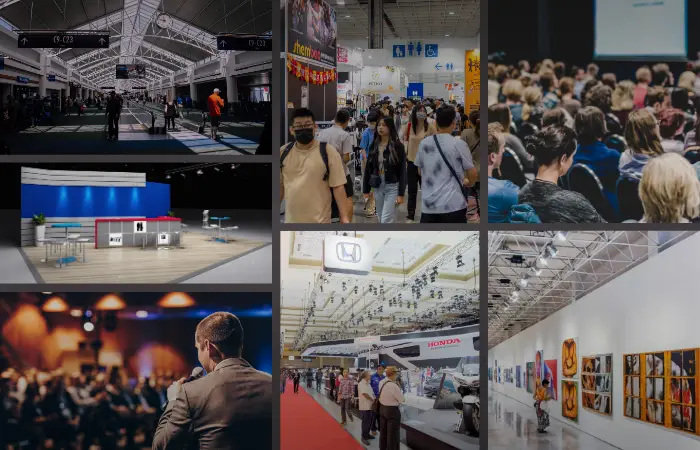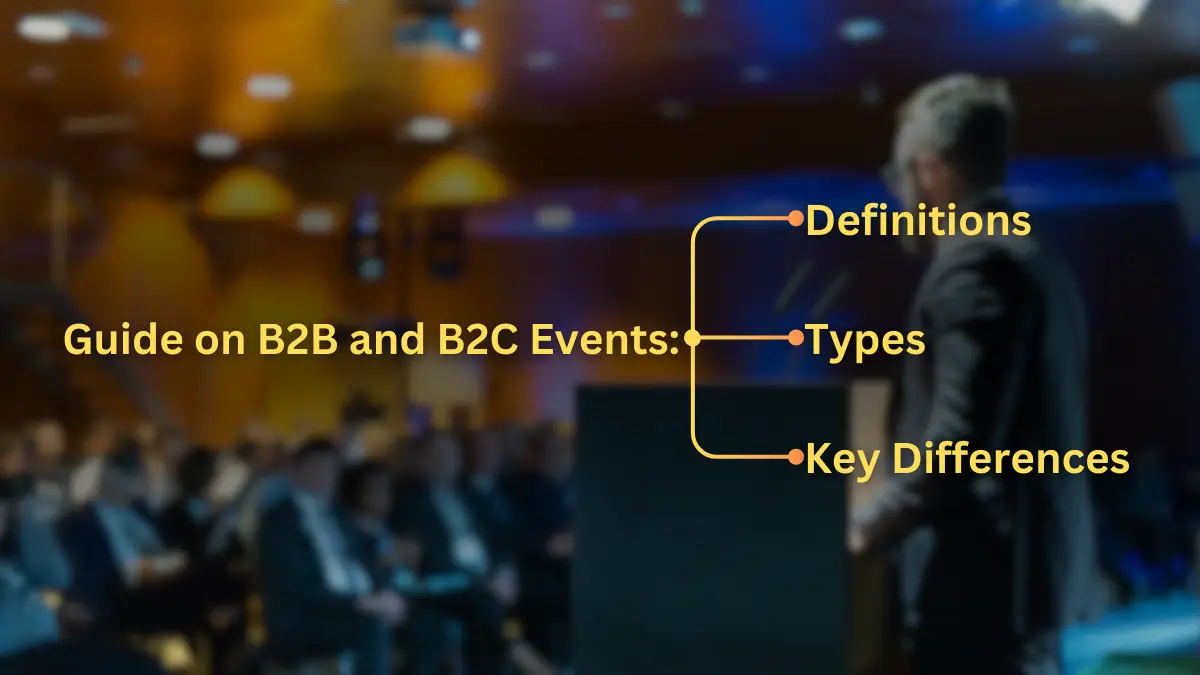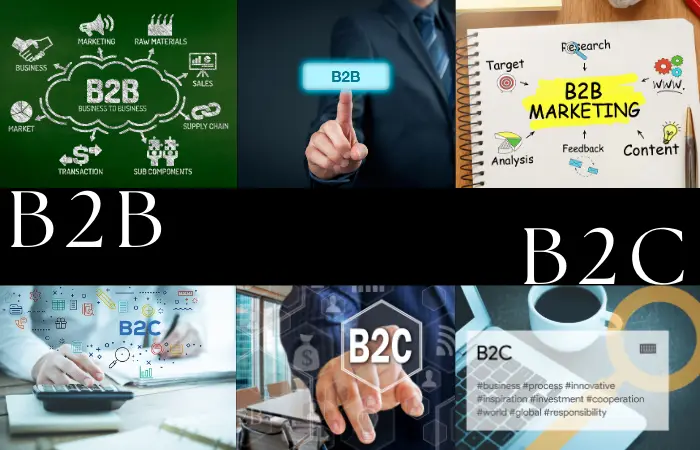In the world of marketing and events, businesses often focus on two primary audiences: other businesses (B2B) and consumers (B2C). The approach to organizing events for these audiences can differ significantly, as the objectives, strategies, and expectations vary. This guide explores the definitions, types, and key differences between B2B and B2C events, providing a comprehensive understanding for event planners, marketers, and business owners.
1. Definitions
A. B2B Events (Business-to-Business Events)
Definition:
B2B events are designed to facilitate interactions, networking, and transactions between businesses. These events bring together professionals, decision-makers, and industry leaders from various companies to discuss business opportunities, share knowledge, and forge partnerships.
Purpose:
- To generate leads and build business relationships
- To showcase products, services, and innovations to potential clients or partners
- To facilitate industry networking and collaboration
- To educate and inform through conferences, workshops, and seminars
- To launch new products or services within an industry
Example:
A technology company may host a B2B conference where they invite other businesses to learn about their new software solutions, engage in workshops, and network with industry peers.
B. B2C Events (Business-to-Consumer Events)
Definition:
B2C events are designed to engage directly with consumers. These events aim to promote products or services to the general public, create brand awareness, and drive sales. B2C events often focus on creating memorable and enjoyable experiences for attendees.
Purpose:
- To attract and engage potential customers
- To drive sales and generate revenue
- To increase brand awareness and loyalty
- To provide hands-on experiences with products or services
- To gather consumer feedback and insights
Example:
A fashion brand might organize a pop-up store or a product launch event where consumers can try on clothes, interact with influencers, and make purchases on the spot.
2. Types of B2B and B2C Events
Both B2B and B2C events come in various forms, each tailored to meet specific objectives. Here’s a closer look at the different types of events within each category:

A. Types of B2B Events
1. Conferences and Summits
Description:
Conferences and summits are large-scale events where industry professionals gather to discuss trends, challenges, and innovations. These events often feature keynote speakers, panel discussions, and breakout sessions.
Purpose:
To educate, inspire, and foster networking among industry peers.
Example:
The Web Summit, a technology conference, attracts thousands of tech professionals, startups, and investors to discuss the future of the industry.
2. Trade Shows and Expos
Trade shows and expos are events where businesses showcase their products and services to other businesses. These events often include exhibition booths, product demonstrations, and networking opportunities.
Purpose:
To generate leads, build brand awareness, and establish partnerships.
Example:
CES (Consumer Electronics Show) is a leading trade show where companies present their latest tech innovations to other businesses and industry professionals.
3. Workshops and Training Sessions
Description:
Workshops and training sessions are interactive events designed to educate professionals on specific skills, tools, or technologies. These events often include hands-on activities and expert-led sessions.
Purpose:
To enhance skills, provide professional development, and offer in-depth training.
Example:
A Salesforce training workshop might be organized to teach sales teams how to use the platform effectively.
4. Networking Events
Description:
Networking events are gatherings where professionals from various industries come together to build relationships, share knowledge, and explore business opportunities.
Purpose:
To facilitate connections, foster collaborations, and create business opportunities.
Example:
BNI (Business Network International) organizes regular networking meetings for business owners to exchange referrals and build connections.
5. Product Launches
Description:
B2B product launches are events where companies introduce new products or services to other businesses. These events often include presentations, demonstrations, and networking opportunities.
Purpose:
To showcase new offerings and generate interest among potential clients or partners.
Example:
Microsoft might host a product launch event to introduce a new software solution to enterprise clients.
B. Types of B2C Events
1. Consumer Fairs and Festivals
Description:
Consumer fairs and festivals are large public events that offer entertainment, shopping, and activities for attendees. These events often feature multiple vendors, live performances, and food stalls.
Purpose:
To attract a large audience, promote products or services, and create brand awareness.
Example:
The Coachella Valley Music and Arts Festival is a popular event that combines music, art, and brand activations to engage consumers.
2. Retail Pop-Ups
Description:
Pop-up shops are temporary retail spaces where brands sell their products directly to consumers. These events often focus on creating a unique and immersive shopping experience.
Purpose:
To generate sales, create buzz, and test new markets or products.
Example:
Nike might open a pop-up store in a major city to launch a limited-edition sneaker collection.
3. Product Launch Events
Description:
B2C product launch events are designed to introduce new products to the public. These events often include product demonstrations, influencer appearances, and media coverage.
Purpose:
To generate excitement, drive sales, and increase brand visibility.
Example:
Apple is known for its high-profile product launch events, where they unveil the latest iPhone models to a global audience.
4. Experiential Marketing Events
Description:
Experiential marketing events create immersive experiences that allow consumers to interact with a brand in a memorable way. These events often include hands-on activities, demonstrations, and entertainment.
Purpose:
To create a strong emotional connection with the brand and leave a lasting impression on consumers.
Example:
Coca-Cola might organize an interactive experience where attendees can create personalized Coke cans and share their experience on social media.
5. Community Events
Description:
Community events are organized by brands to engage with local communities and create goodwill. These events can include charity runs, food drives, or family-friendly activities.
Purpose:
To build brand loyalty, give back to the community, and foster positive relationships.
Example:
A local supermarket might sponsor a charity run, with proceeds going to a local food bank.
3. Key Differences Between B2B and B2C Events
While B2B and B2C events share some similarities, they differ significantly in terms of their objectives, target audiences, marketing strategies, and overall approach. Here’s a breakdown of the key differences:
B2B vs. B2C Events
A. Target Audience
- B2B Events:
The target audience for B2B events is other businesses, including decision-makers, industry professionals, and company representatives. The focus is on building relationships, generating leads, and closing deals with other businesses. - B2C Events:
The target audience for B2C events is individual consumers. The goal is to engage the general public, create brand awareness, and drive sales directly to consumers.
B. Objectives
- B2B Events:
The primary objectives of B2B events include lead generation, networking, industry education, and partnership building. These events aim to facilitate long-term business relationships and transactions between companies. - B2C Events:
The main objectives of B2C events are to drive immediate sales, increase brand awareness, and create memorable experiences for consumers. These events often focus on creating a direct impact on the consumer’s purchasing decisions.
C. Event Duration and Frequency
- B2B Events:
B2B events tend to be longer in duration, often spanning multiple days. They may include conferences, seminars, and networking sessions that require participants to invest significant time. - B2C Events:
B2C events are typically shorter, ranging from a few hours to a single day. These events are designed for quick, high-impact interactions with consumers.
D. Marketing Strategies
- B2B Events:
Marketing for B2B events often involves targeted campaigns aimed at specific industries or business segments. Strategies may include email marketing, direct outreach, industry publications, and LinkedIn advertising. - B2C Events:
B2C event marketing focuses on mass appeal and reaching a broad audience. Common strategies include social media campaigns, influencer partnerships, online ads, and media coverage.
E. Engagement Tactics
- B2B Events:
B2B events prioritize content-driven engagement, such as keynote speeches, panel discussions, and workshops. The focus is on providing valuable information and insights that can drive business decisions. - B2C Events:
B2C events prioritize entertainment and experiential engagement. The focus is on creating fun, interactive experiences that resonate with consumers and encourage them to share their experiences on social media.
F. Metrics of Success
- B2B Events:
Success in B2B events is often measured by the number of qualified leads generated, the quality of networking connections made, and the business deals closed. Long-term ROI is a key consideration. - B2C Events:
Success in B2C events is typically measured by immediate sales, the number of attendees, social media engagement, and brand visibility. The focus is on immediate impact and consumer response.
Conclusion
Understanding the differences between B2B and B2C events is crucial for businesses and event planners looking to achieve their objectives. While both types of events aim to promote products, services, and brands, the strategies, audience engagement, and outcomes differ significantly. B2B events focus on building long-term business relationships and generating leads, while B2C events prioritize direct consumer engagement and sales. By recognizing these distinctions, businesses can tailor their event planning and marketing efforts to effectively reach their target audience and achieve their goals. Whether planning a B2B conference or a B2C product launch, a clear understanding of the event type and its specific requirements will ensure a successful outcome.








